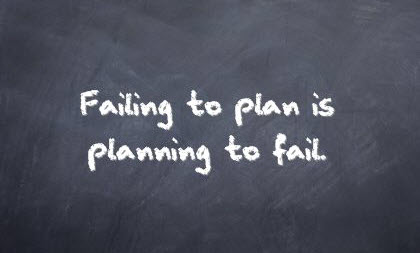The Art of Business Planning!
SMEs with business plans are more than twice as likely to achieve their goals as those without them

POSTED ON: Monday, December 8th, 2014
CATEGORIES: Business Strategy and Planning
According to research done in the UK, SMEs with business plans are more than twice as likely to achieve their goals as those without them. However, despite this evidence, more than one third of UK businesses do not have a plan. A recent Q&A, published in the Pro-actions newsletter explored attitudes within the SME community towards Business Planning. Here are a few thoughts …
Q/. I am just a small business – why do I need a business plan?
An often asked question with an assumption standing behind it that business planning is for corporates OR when you need to talk to the bank! In reality business plans have many purposes from the obvious to some less apparent.
Most people would recognize the need for a plan when trying to secure finance, start a business or grow / make significant changes to their existing business.
Some of the less apparent reasons include providing clarity of strategy for the management team and staff, setting SMART objectives for the organisation, recruiting key talent into the business, sharing strategy with key partners (accountants, professional coaches, banks and business partners / investors) or dealing with “why don’t we do …” questions
Q/. I know what I am trying to achieve; it’s all in my head. Why write a business plan?
There was a survey started amongst Harvard Business school students in 1979 and completed 10 years later when they had all graduated looking at the jobs they had obtained. The study found that:
o Only 3% of the students had written goals; 13% had non-written goals and the remaining 84% had no goals at all
o 10 years later the 13% that had non-written goals were earning x2 on average of those with none. The 3% with written goals were earning on average x10 versus the other 97% put together!
Closer to home, a survey of hyper growth (>100% p.a.) English SMEs found that:
o 96% of hyper growth businesses had formerly planned for ambitious growth in the prior year
o 88% of them reviewed their business plan at least quarterly
o 64% of these hyper growth businesses met or exceeded their targets
Q/. I don’t have time to write a big report; what needs to be in the Business Plan?
That depends upon the purpose; however the first person who benefits from your plan is you and it therefore needs to be your plan to suit your business. That said there are some conventions:
o Executive Summary: Comes first and is written last; the most important section of a business plan. Brief and summarises the what, where, when, how and why your business will be successful.
o Business Description: What products / services will you provide and to whom
o Market: How is it defined? How big is it? Where is it?
o Competition: who else is in the market, what are their strengths and weaknesses
o Marketing Strategy: How will you market your products / services?
o Sales Model: Which channels and methods will you use to sell to your customers? What processes will you put in place to measure and track success?
o Management and organisational plan: This should include talent acquisition and retention measures, training and succession planning
o Operations: Lay out major marketing and operational milestones.
o Risk Assessment: What could go wrong and how will you mitigate against it happening?
o Financial Plan: Not just P/L but a realistic assessment of cash flow and any investment required
Q/. I know I should get around to business planning, but give me three good reasons why it should be a priority?
Planning: Writing your business plan forces you to review everything at once: your value proposition, marketing assumptions, operations plan, financial plan and staffing plan. Looking at the total picture ensures that everything is linked and interdependencies are identified
Monitoring and Review: When you’re the business owner, the only person holding you accountable for your results on a daily basis is you. Your plan is your yardstick of your progress. It allows you to critically look back at the assumptions you made and ask the difficult questions.
Creating your Future: There is power in writing “We expect 100 customers by the end of year one,” It becomes your goal, the sales team’s goal and a measurable KPI. The plan lays out targets in all major areas: sales, costs, organisation and financing. Once laid out, the targets become performance goals.
Pro-actions can help you build a powerful business plan that works for you, meet with us where ever you like to see how! Click HERE and fill out the form.